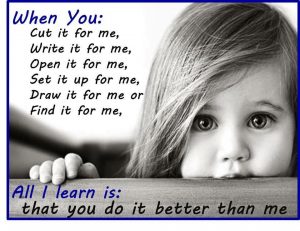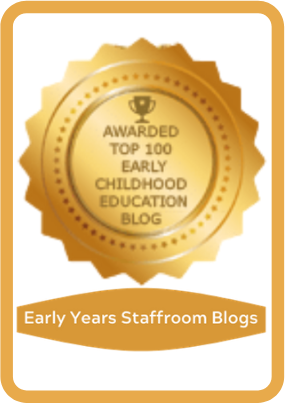Can Year 1 learn the skills they need according to the Ethos of the EYFS?
To begin, I’d like to make it clear that I am not suggesting a specific or prescriptive style of teaching. What I am saying is that, no matter what teaching style, I do not believe children need to sit still on the carpet for extended periods of time and listen to things that don’t interest them or are irrelevant, so that they can learn the art of sitting still and learning! Don’t confuse compliance with engagement. Nor do I think that all children are better off playing all day.
My philosophy, which I firmly believe in and have based my whole teaching practice on, is that the needs of the children need to be responded to. Each child is an individual, each cohort is individual and should be treated as such. Therefore, I am of the belief that there is no ‘one size fits all’ approach to teaching Reception or Year 1.
The Statutory Framework for Early Years (2017) states “Play is essential for children’s development.. Children learn by leading their own play, and by taking part in play which is guided by adults”. Interestingly, the National Curriculum does not stipulate any best method or way of teaching its content. There are no ‘rules’, only outcomes, so actually teachers should have the freedom to teach however they see fit. For more on Ofsted myths see: https://www.gov.uk/government/publications/school-inspection-handbook-from-september-2015/ofsted-inspections-mythbusting
You may be thinking that formal learning in KS1 is necessary in order to get the results that schools need to accomplish at the end of KS1. I disagree and I am sure it is having negative repercussions. It is no coincidence that increasingly many children, especially boys, are being diagnosed with mental health issues. There has also been a lot of publicity about children having to be excluded because of behaviour issues and also children being withdrawn from the education system into home education because they are so depressed at being at school. Could this be because the expectation is that they have to learn by sitting at a table all day and hardly seeing the outside at all? Not being allowed to play?
Although children’s lifestyles have changed over the years, their physical and emotional developmental needs are still the same and ARE NOT being met. As Sue Palmer says: “Giving boys leeway in the early years pays off long-term. With time and space to develop physical, emotional and social skills, they acquire greater levels of self-control and empathy”. Allowing these experiences and freedoms in Reception AND in KS1 would enable children to grown up feeling more successful because their needs are being met, and in return, with this solid and confident foundation, they will grow up being able to access more formal learning when they are ready, instead of being branded a failure from the start.
Thankfully, there is an increasing number of schools moving towards a play based approach in Year 1 and above. In some schools having a mixed Reception and Year 1 class which need to offer play-based learning presents some challenges. We know for certain that the challenges facing our children are getting harder and harder in Reception and Year 1 due to unrealistic government expectations of young children.
The pressures for all children to achieve the absurd measure of attainment called a ‘Good Level of Development’, despite their age and stage and starting points is increasing. In 2016, only 69.3% of children achieved the ‘expected’ level across the prime areas and specific areas of Maths and Literacy.
I’m not here to say which is right for every setting. Instead, I am asking you to think about your children. You know your children the best. You know where they started, where they need to get to and what you need to provide for them to be successful, lifelong learners.
I would like to share my personal experience of my challenge of teaching a mixed class of Reception and Year 1. The children were struggling with independence, confidence, and resilience. The Leuven scales were fairly low for some children. I knew that to gain independence they had to be given independence, to not ‘want’ to constantly play, they needed to be allowed to play, and to gain confidence they needed to make their own choices.
I changed the timetable to allow more play and remove the mid-morning break by introducing rolling snack and allowing a little more flexibility to how the children learn. The children then had at least 1 and ½ hours child initiated time. I didn’t want the children to ask to go to the toilet, have a snack or if they could make something. They needed to make the decisions. They needed to take more ownership over this independence and learning. I then completed a gap analysis which told me that we needed more investigative science and technology in the classroom. I spent a couple of weeks changing the room around to make it ‘perfect’-perfect for them, at that time!
Once the children’s Leuven scales had reached higher levels they were then ‘ready to learn’. I needed to ensure the Year 1 children would make progress. I set up Challenge Books and produced a short-term planning sheet for the Teaching Assistant to see which children needed to focus on which task, using my gap analysis. The TA used this to understand the objectives, the purpose of the play and to ask open-ended questions.
The children really benefited from this approach and I could see that they really started to enjoy their learning. We tried to make every activity hands-on, open-ended and practical. For example, using sandwiches that the children made to cut into halves, quarters and eighths. What better way to learn about halves and quarters? Then the best bit of course-eating them while talking and getting to know the children really well. Relationships are key to great learning and this is all too often forgotten about with the pressure to ‘get through as much of the curriculum as possible’.

The result? Happy children, happy parents, happy teachers and importantly children that were excited and motivated to learn and ready to move onto the next stage.
It’s important to focus on purposeful learning, not just subject knowledge, timetable it in if you have to! Go to forest school, set up lots of science activities, go off on a tangent when the opportunity arises and a child brings in a nest they picked up on the way to school, be brave! Embedding the characteristics of effective learning are essential learning behaviours that set us up for life. We need leaders and inventors with creative and higher order thinking skills. We need to continue to embed these into all children’s learning, not just up to the end of Reception.
I hope you are brave enough to break the mould and go for it! Dead fish go with the flow.
And remember:
Please don’t hesitate to ask questions on our forum if you need any support.











